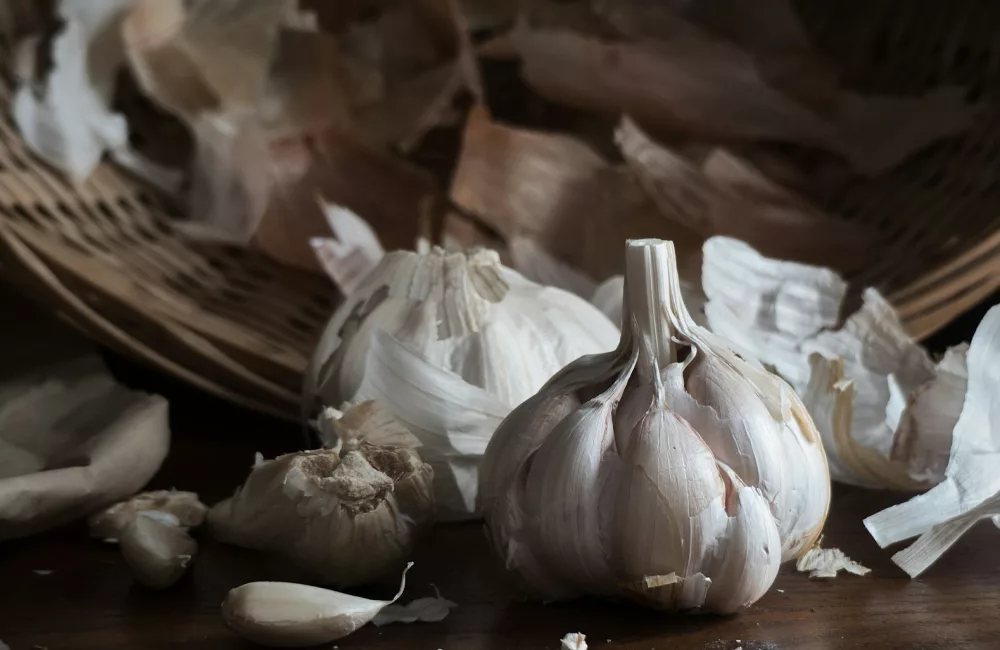The liver is a critical organ in the body, responsible for a host of essential functions, including detoxifying harmful substances, regulating metabolism, producing bile to aid digestion, and storing nutrients. A healthy liver is vital for overall well-being, and its health largely depends on the foods you consume. By incorporating nutrient-dense, liver-friendly foods into your diet, you can enhance your liver’s ability to function optimally, combat oxidative stress, and regenerate damaged cells. Below is an in-depth exploration of 16 foods that promote liver health, along with practical ways to include them in your daily meals.
1. Garlic
Garlic is a small but mighty ingredient that offers a wealth of benefits for liver health. It contains allicin, a sulfur compound that activates liver enzymes, enabling your body to efficiently eliminate toxins and heavy metals. Allicin also has antimicrobial properties that help combat harmful bacteria, viruses, and fungi that could burden the liver. Additionally, garlic is a rich source of selenium, a trace mineral that enhances the liver’s antioxidant capacity, protecting liver cells from oxidative stress and damage.
Incorporating garlic into your meals is simple and highly versatile. To maximize its health benefits, crush or chop fresh garlic and let it sit for a few minutes before cooking, as this process enhances the release of allicin. Add garlic to soups, stews, stir-fries, or roasted vegetables to elevate both the flavor and nutritional value of your dishes. If you’re not a fan of the pungent taste, consider adding it to salad dressings or marinades for a more subtle flavor profile.
2. Leafy Greens
Leafy greens like spinach, kale, Swiss chard, and arugula are some of the most nutrient-dense foods you can consume to support liver health. These greens are packed with chlorophyll, a natural compound that helps neutralize toxins, including heavy metals, pesticides, and other harmful substances that can accumulate in the liver. Additionally, their high levels of fiber support digestion and help regulate bile production, a key function of the liver that aids in fat breakdown and waste elimination.
The benefits of leafy greens extend beyond detoxification. These vegetables are also rich in vitamins A, C, and K, as well as minerals like magnesium and potassium, which contribute to overall liver function. Including leafy greens in your diet is easy and delicious. Toss them into salads, blend them into smoothies, or sauté them with olive oil, garlic, and a pinch of salt for a simple yet nutritious side dish. They can also be added to soups, omelets, or pasta dishes for an extra boost of nutrients.
3. Turmeric
Turmeric, often referred to as a “golden spice,” is a potent anti-inflammatory and antioxidant powerhouse. Its active compound, curcumin, has been extensively studied for its liver-protective properties. Curcumin helps reduce inflammation in the liver, combat oxidative stress, and support the liver’s natural detoxification processes by stimulating the production of bile. Additionally, turmeric may help prevent fat accumulation in the liver, a common precursor to non-alcoholic fatty liver disease (NAFLD).
Adding turmeric to your diet can be both flavorful and health-promoting. Use it as a seasoning in curries, soups, and rice dishes, or stir it into roasted vegetables for an earthy flavor. You can also incorporate turmeric into beverages, such as golden milk or turmeric tea, for a warming and liver-friendly drink. To enhance the absorption of curcumin, pair turmeric with black pepper, as piperine, a compound in black pepper, increases its bioavailability.
4. Beets
Beets are a vibrant, nutrient-dense root vegetable that provides a wealth of benefits for liver health. They are rich in betalains, natural pigments with powerful antioxidant and anti-inflammatory properties that protect liver cells from damage. Beets also contain nitrates, which help improve blood flow to the liver, enhancing its efficiency in processing toxins and metabolizing nutrients. Moreover, their high fiber content supports digestive health, indirectly reducing the burden on the liver.
Incorporating beets into your diet is an excellent way to promote liver detoxification and overall wellness. Roast them with olive oil and herbs for a sweet and earthy side dish, or steam and slice them to add to salads. Beets can also be blended into smoothies or juiced alongside carrots, apples, and ginger for a nutrient-packed beverage. Their natural sweetness pairs well with citrus flavors, making them a versatile ingredient for a variety of recipes.
5. Grapefruit
Grapefruit is a refreshing and nutrient-packed fruit that offers significant benefits for liver health. It is an excellent source of naringenin and naringin, two powerful antioxidants that protect liver cells from oxidative damage. These compounds also reduce inflammation, enhance fat metabolism, and stimulate the production of liver enzymes that aid in detoxification. Additionally, grapefruit’s high vitamin C content supports the immune system and acts as an antioxidant, further promoting liver function.
To enjoy grapefruit’s liver-protective benefits, eat it fresh as a snack or incorporate it into your meals. Its tangy flavor pairs well with leafy greens in salads or as a topping for yogurt or cottage cheese. You can also use grapefruit juice in smoothies or dressings. However, if you are on medication, consult your doctor, as grapefruit can interact with certain drugs.
6. Walnuts
Walnuts are one of the most liver-friendly nuts you can eat, thanks to their rich content of omega-3 fatty acids, glutathione, and arginine. These nutrients work together to detoxify the liver, reduce inflammation, and protect against oxidative stress. Omega-3 fatty acids, in particular, are known to help reduce fat accumulation in the liver, which is especially beneficial for individuals at risk of fatty liver disease.
Including walnuts in your diet is simple and satisfying. Snack on a handful of walnuts as a quick and nutrient-packed snack, or chop them up to sprinkle over salads, oatmeal, or yogurt. They can also be incorporated into baked goods, such as muffins or bread, for added texture and flavor. For a savory twist, use crushed walnuts as a crust for fish or chicken.
7. Fatty Fish
Fatty fish, such as salmon, mackerel, and sardines, are rich sources of omega-3 fatty acids, which are essential for liver health. These healthy fats help reduce inflammation in the liver, improve fat metabolism, and protect liver cells from damage. Consuming omega-3s regularly has been shown to lower the risk of liver-related conditions, including non-alcoholic fatty liver disease (NAFLD).
To enjoy the liver-protective benefits of fatty fish, aim to include them in your diet at least twice a week. Grill, bake, or steam the fish for a healthy and flavorful meal. Pair it with leafy greens or roasted vegetables for a complete, nutrient-dense dish. You can also add fatty fish to salads or use it in tacos for a creative and delicious way to boost your omega-3 intake.
8. Olive Oil
Olive oil is a cornerstone of the Mediterranean diet and a highly beneficial fat for liver health. It has been shown to reduce inflammation and lower levels of liver enzymes, indicating improved liver function. Additionally, olive oil supports fat metabolism, preventing fat accumulation in the liver and reducing the risk of fatty liver disease.
Incorporating olive oil into your meals is easy and delicious. Use extra virgin olive oil as a base for salad dressings, drizzle it over roasted vegetables or whole grains, or use it for light sautéing. Its rich, fruity flavor enhances a wide variety of dishes, making it a versatile and healthy choice for supporting liver function.
9. Avocados
Avocados are a nutrient-rich superfood that provides numerous benefits for liver health. They are loaded with monounsaturated fats, which are considered healthy fats that reduce inflammation and improve cholesterol levels. Avocados are also a significant source of glutathione, a powerful antioxidant that helps the liver detoxify harmful substances. By enhancing the liver’s natural detox processes, avocados protect it from damage caused by toxins and oxidative stress.
In addition to their antioxidant properties, avocados are rich in fiber, potassium, and vitamins C, E, and K, which support overall health. The creamy texture and mild flavor of avocados make them incredibly versatile. You can enjoy them mashed as guacamole, sliced in salads, or spread on whole-grain toast. For a sweeter option, blend avocados into smoothies or puddings. Including avocados in your diet not only supports liver health but also contributes to heart health and better digestion.
10. Coffee
Coffee is one of the most extensively studied beverages when it comes to liver health, and the research is overwhelmingly positive. Regular coffee consumption has been shown to lower the risk of liver diseases such as cirrhosis, liver cancer, and fatty liver disease. Coffee helps protect liver cells by reducing inflammation and oxidative stress. It also increases the production of antioxidants in the liver, which helps neutralize free radicals.
The caffeine in coffee plays an additional role in liver health by promoting the production of bile, which aids in fat digestion and the removal of toxins. Drinking two to three cups of coffee per day has been associated with significant liver health benefits. For the best results, drink your coffee black or with minimal additions like unsweetened almond milk. Avoid sugary syrups and creamers, which can counteract coffee’s positive effects.
11. Green Tea
Green tea is another beverage that offers remarkable benefits for liver health. It is rich in catechins, powerful antioxidants that help protect the liver from oxidative damage. These antioxidants also support the liver’s ability to metabolize fats and reduce inflammation. Studies suggest that regular consumption of green tea can improve liver enzyme levels and help prevent fat accumulation in the liver.
Incorporating green tea into your daily routine is simple. You can enjoy it hot, iced, or even in powdered form as matcha. To boost its liver-protective properties, pair green tea with a squeeze of fresh lemon juice, which enhances the absorption of catechins. Whether enjoyed in its pure form or blended into smoothies, green tea is a refreshing and health-promoting choice for your liver.
12. Blueberries
Blueberries are often referred to as a “superfood,” and for good reason. They are packed with anthocyanins, a type of antioxidant that helps protect the liver from damage caused by toxins and inflammation. These compounds also stimulate liver cell regeneration, helping the liver repair itself more efficiently. Blueberries may even help reduce fat buildup in the liver, making them beneficial for preventing non-alcoholic fatty liver disease (NAFLD).
Adding blueberries to your diet is easy and delicious. You can enjoy them fresh as a snack, mix them into yogurt or oatmeal, or blend them into smoothies. Their natural sweetness makes them a healthy alternative to sugary snacks, while their nutrient profile provides significant support for liver health. For a unique twist, try adding blueberries to salads or baking them into whole-grain muffins.
13. Broccoli
Broccoli and other cruciferous vegetables like cauliflower, Brussels sprouts, and cabbage are exceptional for liver health. These vegetables contain sulforaphane, a natural compound that enhances the liver’s detoxification enzymes. Sulforaphane helps the liver break down and eliminate harmful chemicals and toxins, reducing the risk of liver damage. Broccoli is also high in fiber, which supports digestion and helps the body excrete waste more effectively, alleviating the liver’s workload.
To enjoy the liver-protective benefits of broccoli, try steaming or roasting it with olive oil, garlic, and a pinch of salt. You can also add it to stir-fries, soups, or casseroles for a nutritious and versatile ingredient. The mild flavor of broccoli pairs well with a variety of seasonings, making it an easy addition to your meals. For maximum benefits, include other cruciferous vegetables in your diet as well, as they offer similar liver-friendly properties.
14. Apples
Apples are a simple yet powerful food for liver health. They are rich in pectin, a type of soluble fiber that helps remove toxins from the digestive system. By reducing the toxin load in the gut, apples allow the liver to focus on its other essential functions, such as detoxification and nutrient metabolism. Additionally, apples contain a variety of antioxidants, including vitamin C and quercetin, which help protect liver cells from oxidative stress.
Apples are incredibly versatile and can be enjoyed in numerous ways. Eat them fresh as a snack, slice them into salads, or bake them with a sprinkle of cinnamon for a healthy dessert. Apples can also be blended into smoothies or juiced with other fruits and vegetables for a refreshing and liver-supportive drink. Opt for organic apples whenever possible to avoid pesticide residues that could burden the liver.
15. Lemons
Lemons are a citrus fruit with powerful detoxifying properties that make them excellent for liver health. They are packed with vitamin C, an antioxidant that boosts the production of glutathione, a compound crucial for liver detoxification. Lemons also stimulate bile production, which helps the liver process fats and flush out toxins. Additionally, their alkalizing effect on the body promotes a balanced pH level, further supporting the liver’s natural cleansing processes.
Start your day with a glass of warm water mixed with freshly squeezed lemon juice to kickstart your liver’s detoxification process. You can also use lemon juice as a flavor enhancer for salads, marinades, or roasted vegetables. The zesty flavor of lemons not only adds brightness to dishes but also provides significant health benefits.
16. Pomegranate
Pomegranates are a nutrient-dense fruit that offers numerous benefits for liver health. They are rich in polyphenols, antioxidants that protect the liver from oxidative damage and inflammation. Pomegranates also contain vitamin C, which supports the immune system and aids in the liver’s detoxification processes. Additionally, the fruit’s anti-inflammatory properties help reduce the risk of chronic liver diseases.
To incorporate pomegranate into your diet, sprinkle the seeds (arils) over salads, yogurt, or oatmeal. You can also enjoy them on their own as a refreshing snack or blend them into smoothies for a tangy, nutrient-packed beverage. Pomegranate juice is another option, but make sure to choose varieties without added sugars to maximize its health benefits.
Final Words
The liver is a remarkable organ that plays a central role in detoxifying your body, metabolizing nutrients, and maintaining overall health. However, its efficiency and resilience can be influenced by your lifestyle and diet. By incorporating liver-friendly foods like garlic, leafy greens, turmeric, beets, walnuts, and fatty fish into your daily meals, you can provide the nutrients and antioxidants necessary to protect your liver from damage, reduce inflammation, and enhance its natural detoxification processes.
In addition to eating these foods, it’s essential to adopt habits that support liver health, such as staying hydrated, exercising regularly, and limiting alcohol and processed food consumption. The liver is a highly resilient organ, capable of regenerating itself when given the right care and nourishment. Making conscious choices about your diet and lifestyle can have a profound impact on your liver’s ability to function optimally, which in turn benefits your overall well-being.
Remember, your liver works tirelessly to keep you healthy—so take the time to care for it. By embracing a nutrient-rich, balanced diet that includes these 16 powerhouse foods, you can ensure your liver stays strong, efficient, and ready to support you for years to come.






